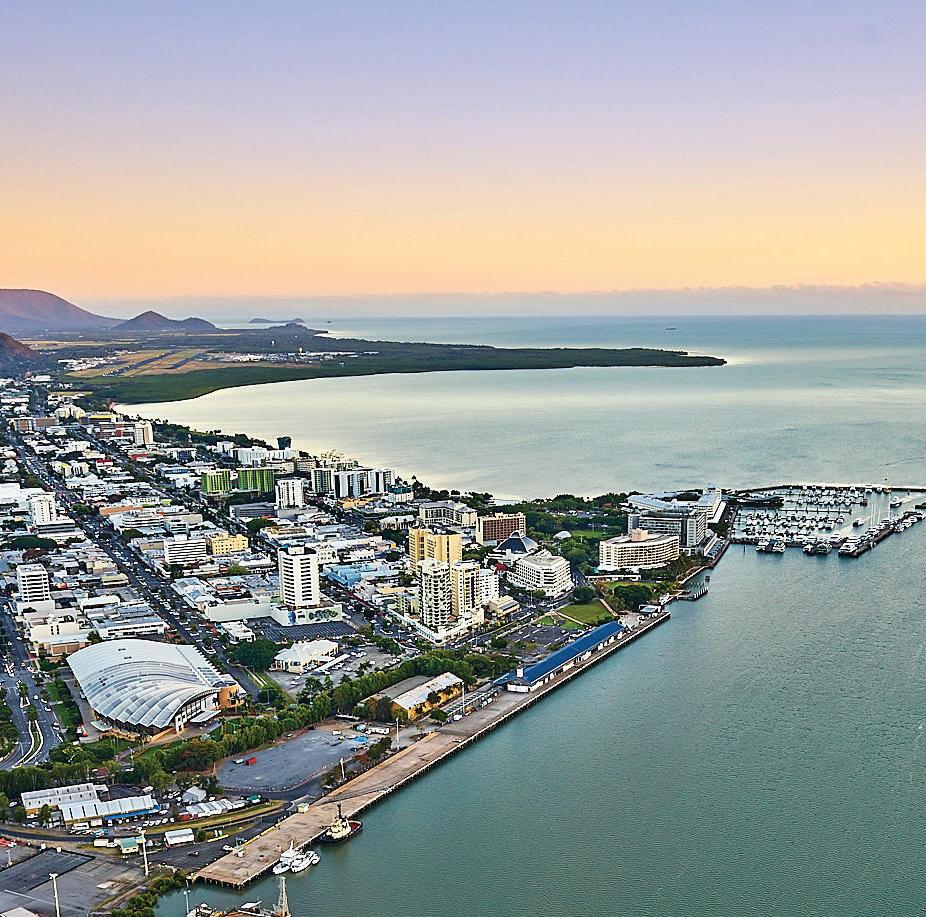
5 minute read
Policy priorities
Our policy priorities in 2020 built on the major review undertaken in 2019, with several priorities updated due to successful advocacy and others reviewed in light of the current environment.
Given the severe impact of COVID-19 on the region’s economy, one key priority which required refocussing surrounded aviation route development. Considerable short-term government support has been provided. This will continue to evolve during 2021 as Cairns looks to re-establish international air links as borders re-open.
Advertisement
Cairns University Hospital
highlights In 2020, the Qld State Government declared its intention to build the Cairns University Hospital, announcing funding for a preliminary business case and land purchase. The 2020-21 State Budget confirmed recurrent funding for the Cairns and Hinterland Hospital and Health Service would be $1.057bn, the same level as the previous year.
Cairns Hospital is progressing towards obtaining University Hospital status following the State Election commitment with talks underway to select and purchase land, in conjunction with James Cook University. In terms of operational funding, two key milestones remain to be achieved: securing extra Commonwealth Supported Places to enable full medicine degrees to be taught in Cairns and increased recurrent funding from the State to deliver higher level services.
Cairns Aviation Route Development
highlights During COVID-19, Cairns lost 95% of its total air capacity for the three months ending June 2020. Globally, international airline capacity is not expected to return to pre-COVID capacity until after 2023.
State and Federal Governments have recognised the effect of COVID-19 and the disproportionate impact on the Cairns region with several packages to assist, including $10 million destination funding for Tourism TNQ in the Federal Budget. With the assistance of the Federal Government and its International Freight Assistance Mechanism (IFAM), crucial export routes have been retained. Importantly, visitor numbers to the region for December, following the reopening of borders, rebounded to 70% of pre-COVID-19 numbers.
3
Superyacht Chartering
hightlight A Special Recreational Vessels Bill was passed by the Senate on 5 December 2019 allowing foreign owned superyachts to charter in Australia via temporary licenSes.
Benefits of the Superyacht bill for the Cairns economy are yet to be fully realised due to COVID-19. Despite the border restrictions, a total of three vessels ran four charters with an economic benefit of $8.54 million to the Australian economy. Advance Cairns is advocating for permanent legislative change as a temporary licencing option under the Special Recreational Vessels Bill is due to expire in June this year.
4
Strategic Energy Sector Framework
highlight Notwithstanding the lack of a government framework, the energy sector continues to set its own agenda with multiple renewable energy projects being initiated in the region, as well as State Government commitment to a Northern Renewable Energy Zone (REZ).
To achieve energy security and affordability while also transitioning to a lower emission environment, TNQ will require a region-wide strategic investment framework and bilateral Government support. Shared investment of approximately $1.5 million (based on 50:50 contributions) is being sought from the State and Federal Governments to develop the TNQ Energy Sector Investment Framework.
5
Land Use and Agriculture
key highlight The completion of the Advance Cairns’ led Export 2030 – Delivering Fresh Food Fast report in conjunction with the Co-operative Research Centre for Northern Australia and key industry stakeholders marked an important step towards an ambitious yet achievable target of doubling high value food exports from Cairns airport by 2030.
Increased investment to drive more rapid growth in agricultural production requires much greater certainty around land use and tenure. Initial conversations with the State Co-ordinator General are focused on Advance Cairns’ recommendation to create a framework to establish Strategic Agricultural Development Areas in QLD.
6
Cairns City Deal
key highlight Uncertainty surrounds the future of the City Deals program with the major QLD agreement – known as the SEQ City Deal – having made little material progress in 2020. Infrastructure Australia has indicated no further funding is currently available for new City Deals or Regional Deals.
To position Cairns as an economic powerhouse in northern Australia, a City Deal is required to fast track catalytic investments. The implementation of a Cairns City Deal aligns with and supports the implementation of a number of key strategies at the Local, State and Federal Government levels.

7
Pacific Engagement Strategy
key highlight The announcement that Cairns is to be the first of three Naval Regional Maintenance Centres in Australia to become operational is a major step towards confirming the strategic importance of Cairns and its role as a hub for maintaining peace and security in the Pacific region.

With increased Federal investment in security infrastructure in the Pacific, Cairns is perfectly placed to drive the implementation of Australia’s Pacific Step-Up engagement strategy. Cairns provides the Department of Foreign Affairs and Trade with a close, well connected location to enable stronger partnerships with Pacific nations. In addition to working to secure an Office of the Pacific presence in Cairns, a $1.5 million Federal Government grant is being sought to develop a comprehensive strategy that identifies and maximises initiatives that position Cairns as the Pacific capital of Australia.
8
Population and Migration Strategy
key highlight COVID-19 has created a spike in migration out of Australia’s major capital cities and into regional areas, with Cairns well situated to reap the benefits of the population shift. The Regional Australia Institute has established a group known as the Regional Activators Alliance to launch a multimillion-dollar, multi-media campaign in mid-2021 with the aim of accelerating this population shift.
Advance Cairns is one of more than 30 organisations which have joined the RAI’s Regional Activators Alliance. To maximise the COVID-driven opportunity in this region, a population and migration strategy is needed to provide the framework for the infrastructure, services and facilities required to attract, retain and support a skilled and growing resident population in TNQ. The strategy will inform policy development regarding infrastructure, liveability, social cohesion and workforce planning, delivering the change required for economic development, and aiding in the creation of a master brand that overcomes perceptions of poor infrastructure, services and amenity in the region.






